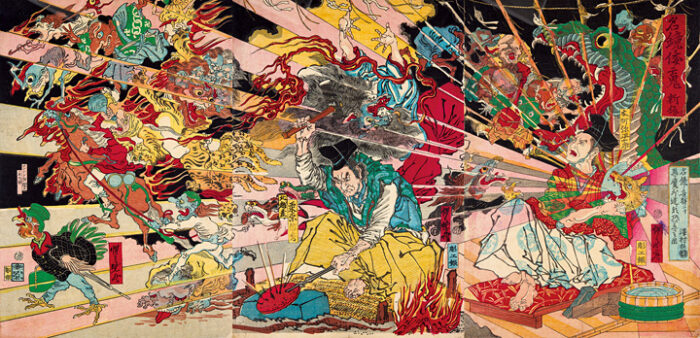Published in Nikkei Asia August 11 2024
Some countries have more history than others, in the sense of an unbroken record of significant events. While falling short of China’s three millennia of civilization, Japan has a long and rich national story that stretches back some 2,000 years.
What makes it extraordinary is the country’s resilience in the face of all kinds of adversity, from Mongol invasion to atomic bombing, from devastating earthquakes and volcanic eruptions to an 80% collapse in land and stock prices.
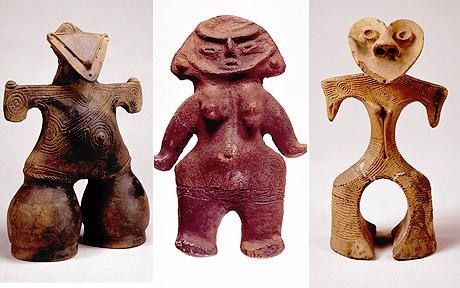
Jomon figurines -from 2470 to 500 BC
In fact, most of the world’s oldest businesses are Japanese. The grand champion of durability is Nishiyama Onsen Hotel, which was founded in 705 and operated by the same family into the 21st century.
It may seem counterintuitive to produce a “shortest history” of such a country, but academic historians tend to compartmentalize, and often risk missing the forest for the trees. The strength of Lesley Downer’s book is the perspective it gives on ancient and recent happenings. Some of the dilemmas that Japan faced 1,400 years ago, such as how to deal with its much larger and frequently difficult neighbor, are echoed in today’s world.
Downer is a novelist and nonfiction writer who specializes in Japanese themes. Her novelistic experience must have aided the sharp, pacy, but clear and informative writing of “The Shortest History.” What could have been a dry recital of names and dates becomes a parade of colorful characters, remarkable achievements and innovations.
Weaving a narrative that does it justice, while digressing into matters such as literature, food, religion, high politics, gender roles, aesthetics and war, all in a mere 50,000 words, would seem an impossible task. Yet the author pulls it off with panache.
The book is perfectly timed. After the lingering malaise of “the lost decades” (from the bursting of the Japanese stock market bubble in 1990 to the late Shinzo Abe’s return as prime minister in December 2012) Japan is firmly back in the global consciousness. Tourism has soared from 4 million arrivals at the turn of the century to a forecast 34 million this year, with visitors from neighboring Asian countries the most numerous. The super-competitive yen has played a part, but it remains the case that, despite costly air travel, people want to experience the charm and depth of Japanese culture directly.
Meanwhile, Japan’s stock market, moribund for a quarter of a century, has finally blasted to new highs, symbolically repairing the damage done to national self-esteem during the lost decades. Deflation, which encourages passivity and penalizes risk-taking (cash increases in value while debt becomes more onerous) has at last been defeated. For the first time in 60 years, inflation is higher in Japan than in the U.K.
This Japanese revival was largely constructed by Abe in his record-breaking tenure as prime minister, although his primary purpose was not economic or financial, but geopolitical.
Shockingly, a group of top-level American experts on Japan had published a report in 2012 suggesting that Japan was on the verge of becoming a “tier-two nation.” In other words, the long decades of back-breaking sacrifice in pursuit modernization since Japan’s opening to the Western world in 1868 were about to end in failure.
Abe made his response directly in a visit to the U.S the following year: “Japan is not, and will never be, a tier-two country … I am back, and so shall Japan be,” he told an audience at the Center for Strategic Studies.
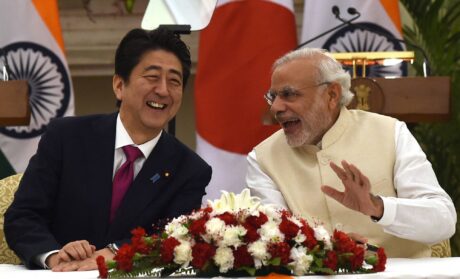
The late Shinzo Abe with Indian Prime Minister in 2015
In order to make that convincing, a raft of initiatives to bolster the economy was rolled out, of which tourism promotion was one. Others included doubling the number of foreigners in the work force, new codes of corporate governance, zero interest rates, “womenomics” (increasing job opportunities for women) and radical reform of the world’s largest public pension fund.
Abe’s geopolitical agenda was driven by the emergence of a powerful and ruthless China, apparently bent on hegemony in East Asia and perhaps elsewhere. He had been conscious of the threat a full decade before Washington wised up, laying out his vision of “the Quad” in 2007. A naval security framework that would bring together Japan, the U.S., India and Australia, it was a brilliant concept that would do much to improve the balance of forces.
All this took place in the last two decades, but Downer’s book shows that independence from China has been a national priority since at least the sixth century. Abe was simply following in the footsteps of the famed administrator and promotor of Buddhism, Prince Shotoku, who refused to accept the role of inferior nation in a Sinocentric world order.
As Downer recounts, “determined to set Japan on an equal footing with China, he drafted a letter from the Japanese empress to the Chinese emperor, addressing it ‘From the sovereign of the land of the rising sun to the sovereign of the land of the setting sun.’ The emperor was reportedly furious at such audacity.”
Even at that stage, Japan was aware of the importance of its national story. Created in 712 for domestic consumption, “The Record of Ancient Matters” was an origins myth designed to boost group solidarity, but “The Chronicle of Japan,” written a few years later, had a larger audience in mind. In Downer’s words, “written in orthodox classical Chinese … it could be displayed with pride to foreign envoys. It showed that the Japanese were equal to the Chinese and had a history of equal weight.”
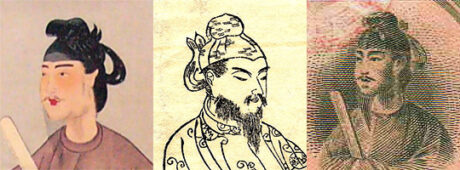
Different aspects of Prince Shotoku
In other words, it performed a soft power function that might today be covered by a Foreign Ministry “Cool Japan” report.
“The Shortest History” begins with the gods emerging from the primordial ooze — and, more prosaically, the land bridges to the continental mass being severed by the end of the Ice Age in around 11,000 B.C., creating the Japanese islands. The saga closes in 2024, but this reader cannot help speculating on what comes next.
If geography is fate, then the rivalry between China and Japan is set to run for decades, perhaps centuries. The toxicity of the relationship will vary according to the nature of political change in China. For the foreseeable future, Japan will fulfil the role of antithesis of China, as mapped out in Abe’s response to the American think-tankers — “a rules promoter, a guardian of the global commons, and an effective ally and partner to the U.S. and other democracies.”
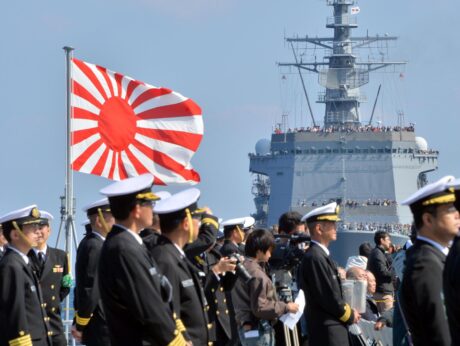
Japan’ s Maritime Self- Defense Forces fly the flag
The Russian invasion of Ukraine in 2022 came as a severe shock to Japan, demonstrating that “might remains right” in the international arena. The knee-jerk pacifism of many Japanese intellectuals is now a marginal and eccentric position. The necessity of an effective defense strategy, which includes new security relationships, is clear. Japan’s military capabilities will grow significantly over time, probably eventually outstripping those of Britain and France.
How else might Japan change? In a fascinating aside, Downer notes that “Japan in the 8th century was extraordinarily cosmopolitan. East met west in its bustling alleys and streets. Visitors from China, India and other parts of Asia flocked to the Nara court.” And at the eye-opening ceremony of the Great Buddha at Nara in 752, “dignitaries from as far afield as Persia gathered … The visitors brought extravagant gifts from along the Silk Roads, from China, India, Central Asia, Greece and Rome.”
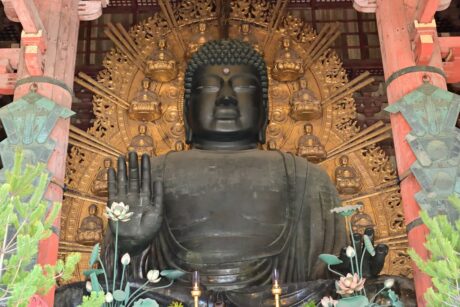
The Great Buddha in Nara
Could Japan become a cosmopolitan power again? It is more than likely, given that its structural shortage of labor can only get worse as the population steadily ages and shrinks. On current trends, the percentage of foreign workers could easily be in double digits in 25 years’ time, compared with 2% today.
Two-way direct investment flows with friendly Asian countries are likely to grow too, following the precedent of Taiwan ‘Semiconductor Manufacturing Company’s 2022 decision to build state-of-the-art plants in Kyushu.
In the early 20th century, Japan acted as a home from home for Chinese anti-Qing dynasty activists and intellectuals such as Chiang Kai-shek, Sun Yat-sen and Liang Qichao; later it hosted anti-British Indian nationalists. That function could be revived as part of Japan’s commitment to guard the global commons, with political exiles from repressive states being offered sanctuary while awaiting change. A recent straw in the wind: Jack Ma, founder of the Chinese conglomerate Alibaba, chose to live in Tokyo when he became persona non grata in China.
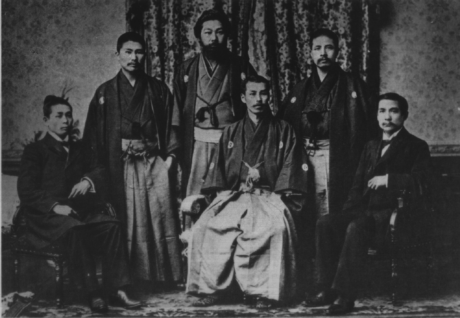
Sun Yatsen (on the right) with Japanese friends in 1900
To put it all together, there will never be an Asian equivalent of the European Union, but a loose partnership of like-minded countries, centered on Japan, is quite possible.
Such thoughts are stirred by “The Shortest History.” If you do not know Japan well, the book is the ideal narrative for getting up to speed. If you do, it will provide a new perspective to ponder.
